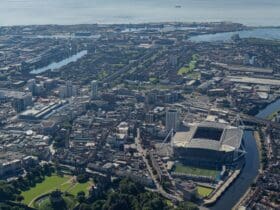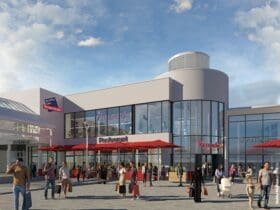Flexible office space is set to more than double in Cardiff over the next five years, outstripping forecast growth for this sector in both Bristol and Birmingham, according to research from global property consultants JLL.
[aoa id=”1″]The success of home-grown co-working companies such as Indy Cube, Tramshed Tech and the Creative Quarter that have set up alongside the established and highly successful Rombourne, Regus and new entrant Bizspace is likely to attract more flexible working operators to the city.[/aoa]
Making up 2.5% (323,000 sq ft) of Cardiff’s total office stock in 2018, the proportion of flexible space is set to raise to 5.4% by 2023, as outlined in JLL’s new report ‘Disruption or distraction, where next for the UK flex market sector,’ published this week.
Demand from SMEs, alongside a growing trend for remote working and self-employment is acting as a pull factor for operators, along with increased competition and rising demand for flexible workspace. But what is driving even greater change is the fact that landlords and developers are now adapting their facilities for leased office space as a result.


They are being forced to consider what the rise of the flexible office sector means for their portfolios and how to make sure that their space remains relevant and delivers the best returns. We are therefore seeing more landlords convert and update current stock to meet this growing demand for flexible space not only from commercial co-working space operators, but from occupiers too.
Flexible work spaces have been a growing trend for several years, starting with serviced offices in the mid-1980s then followed by co-working which took off after the financial crisis and offered a completely new style of working designed to encourage collaboration, knowledge sharing and innovation in an open and creative space.
However, whilst co-working has been a fashionable term, the report shows there has been some diversification in the sector to meet demand. A high proportion of online searches are for private office space within a flexible environment and consequently, operators are increasingly offering a hybrid model which offers both private office space and shared co-working areas.
Though many operators frequently use the co-working term to suggest a sense of modernity to their offer, true co-working brands are few and far between and generally have a relatively small footprint. JLL estimates that co-working operators make up just 8% of the UK’s total flexible office stock.
In Cardiff, there has been a gradual increase in flexible working companies since 2010 and JLL is predicting further strong growth.
Rhydian Morris, director in JLL’s Cardiff office said:
“Cardiff has 8,500 self-employed people – and this is predicted to grow significantly over the next five years. Add to this the fact that a fifth of the population is made up of students, many of whom will stay in the city after graduation, and it is obvious why Cardiff is a prime spot for flexible office space and co-working.
“Successful companies such as Indy Cube, which now has six co-working spaces in the city as well as the diverse and innovative office space offered at the likes of the Tramshed Tech and Creative Quarter, have proved how popular the concept is in the city and are paving the way for new providers.
“But the big change is that landlords and investors are now seeing the merit of adding collaborative and break out areas and funky fit-outs. This is a trend that is set to continue as property owners seek to differentiate their offer from both their conventional and co-working competitors.







Leave a Reply
View Comments